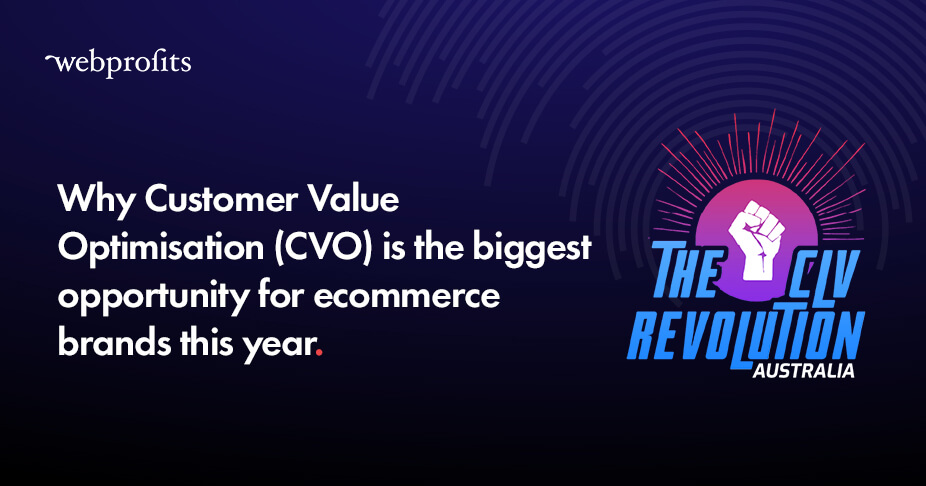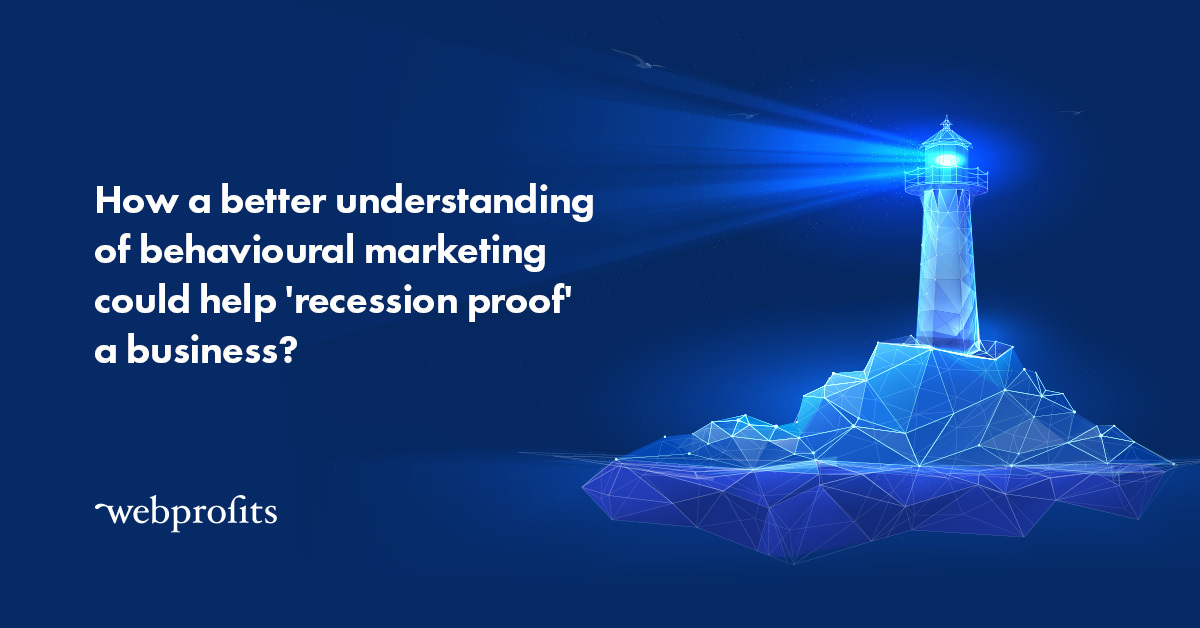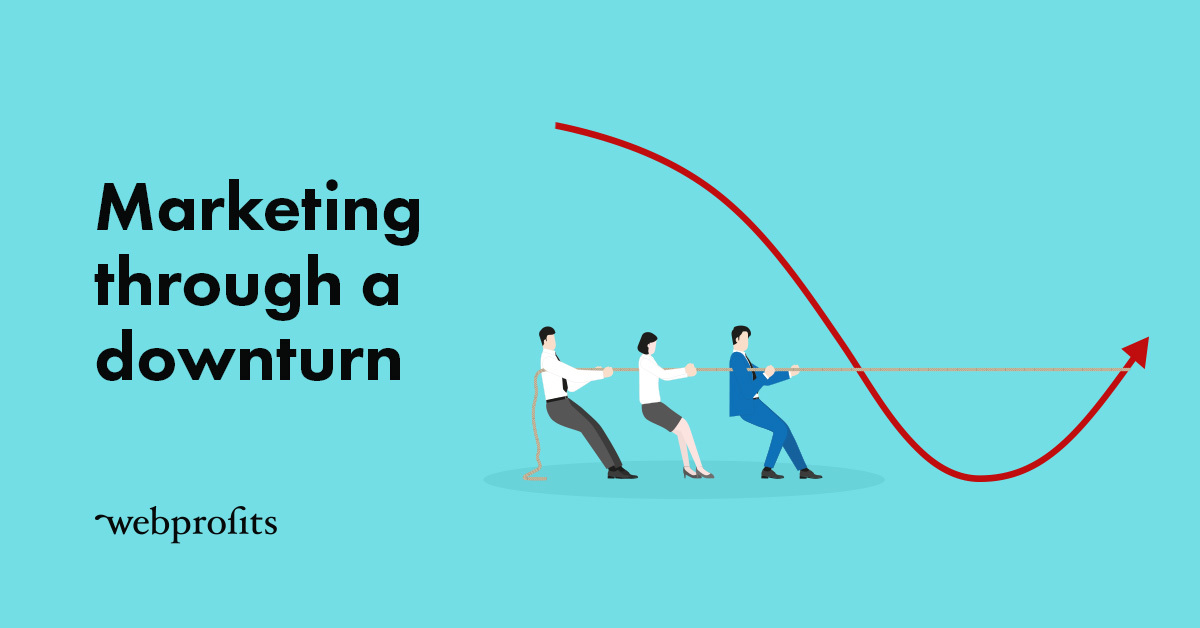Mecca’s eCommerce Growth Strategy
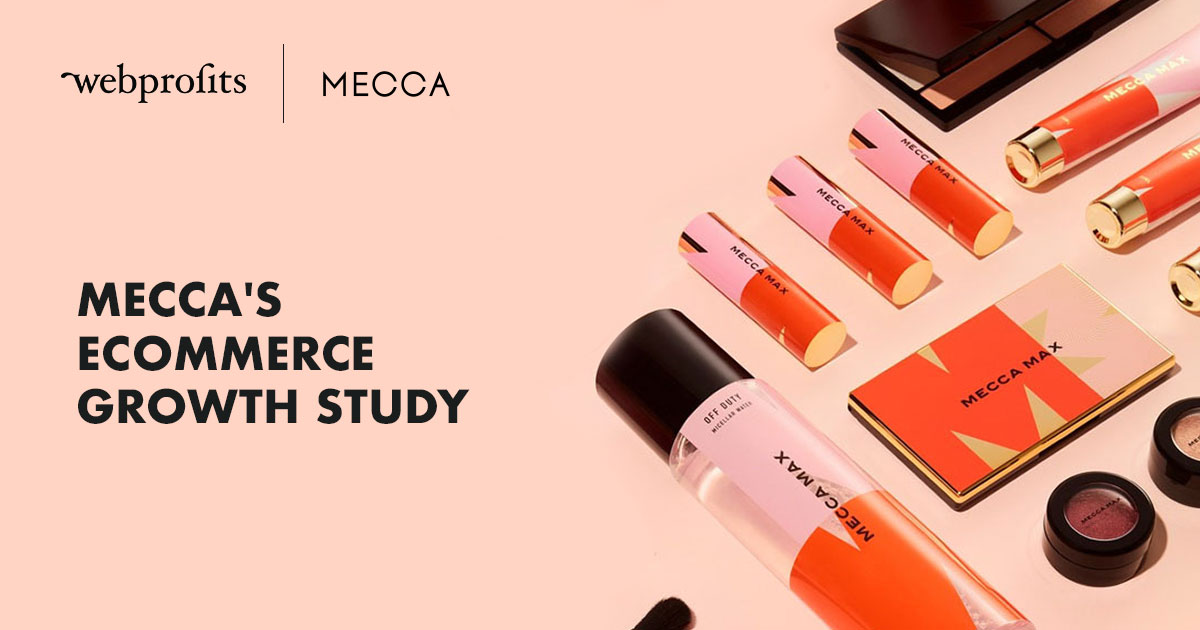
Mecca describe themselves as “a high touch, high service beauty boutique supported by a curation of the world’s most luxe brands”.
They operate a chain of 100+ stores selling beauty products and hold approximately 10% market share in what is a notoriously competitive industry worth $4.2 billion.
Their founder and CEO Jo Horgan attributes a lot of their success to their utilisation of eCommerce, which makes up 15% of their total sales, so we decided to breakdown their digital marketing strategy to find out how.
BONUS: Get the Mecca’s eCommerce Growth Strategy as a PDF. Click here to download it free, and get more case studies like this in your email inbox.
This article will run through some of their key digital marketing channels and strategies to highlight the things they’re doing particularly well and/or differently to earn their place as one of the most successful beauty brands in Australia.
- Mecca’s Customer-Centric Approach
- Mecca’s Website
- Mecca’s Content
- Mecca’s Paid Search
- Mecca’s Organic Search
- Mecca’s Facebook Ads
- Mecca’s Email Marketing
Want to get all the top level info in 30 seconds? Check out the key takeaways from the end of each section.
Let’s get into it…
The customer is queen
“We have had a maniacal focus on the customer since the outset – the customer is queen – and every decision has been built with this in mind. It has meant a higher cost of staffing and education than any industry norm; it means not compromising on any customer facing item – brand, store build, collateral and so the list goes on.” Source
This is just one of many quotes available where CEO Jo Horgan shares Mecca’s commitment to their customer, outlining a number of initiatives that puts their needs first.
Mecca’s dedication to their customer is one of the reasons why they are so successful. They’ve built a business that customers adore and keep coming back to time and time again.
How?
Their staff are highly trained
Mecca spend 3% of their revenue on training staff – a much higher proportion of sales than pretty much anyone else in retail.
Their staff play an active role in their stores and are taught to be helpful instead of push for sales. The more the staff pass on their knowledge to their customers, the more the customers understand about their products and the more informed their purchasing decisions are.
As a general rule the more the customer knows, the more likely they are to buy.
The transaction is a byproduct of customer engagement.
Taking that into consideration, we’ve put 30 per cent of store space towards interactive experiences, because the transaction is just a byproduct of that customer engagement.
This quote, for me, sums up why Mecca focuses on what the customer wants.
Retail space is hard to come by and yet they allocate 30% of it towards actively engaging the customer, providing experiences that allow the customer to test, experiment and play with different products to understand what works best for them.
Beauty products don’t come cheap so customers can often be hesitant to invest in a product that might not be for them.
Giving them the opportunity to try a range of products (including ones they might not have considered before) takes away the fear of the unknown and empowers the customer to make a decision that they are confident in – thus leading to more sales.
They segment their customers
I’m not talking about CRMs here.
Mecca have created two distinct brands that their customers can follow
Mecca Cosmetica is their original luxury boutique offering and Mecca Maxima is aimed at a younger demographic.
Why make this distinction?
Perhaps more than any other, the beauty industry sells an ideal outcome. Customers want to look like the people who use the product. Whether that’s having the same complexion as a model, the same look as a celebrity, or the same hair as a friend – their customers buy their products in order to emulate a style.
The more their customers see people who look similar to them using Mecca’s products, the more likely they are to resonate with them and ultimately buy.
They reward loyalty
Acquiring customers isn’t cheap and many eCommerce businesses will not make a profit on customer’s first purchase, and so it’s important to find ways to keep customers coming back.
I’ve highlighted throughout this article how Mecca provide so much value that it gives customers a reason to keep coming back but they take it one step further with their Beauty Loop program.

The premise is simple – Once you start spending more than $300 a year, Mecca provide you with perks such as
- Free samples
- New arrivals
- Makeup applications
- Birthday gifts
- Exclusive offers
- Tickets to VIP events
- And more
They have three tiers and the more you spend, the more you get.
Gamifying the system encourages the customer to spend more of their expenditure with Mecca and so keeps them coming back to make more and more purchases.
Key Takeaway: Mecca and their customers both benefit from the desire to put the customer first. The more they educate their customers, and the more their customers feel catered to, the more likely they are to purchase. They also reward loyalty in order to make more revenue from each customer.
Now let’s see how they put that into practice online.
[optin-monster slug=”cfaihpn91geyclre8uke”]Website
It’s one thing to be customer-centric in your physical stores and communication with customers, but it’s another challenge entirely to bring that centricity into the digital realm and onto your website.
But Mecca does it very well and I’ll be highlighting how in this section of the article.
Keep key features above the fold
There are a number of key features that Mecca keep above the fold on their homepage.
Note: I’ve visited the Mecca site a number of times in the last few weeks as I researched and wrote this article and the main homepage banner seems to change every time. This indicates that they don’t just “set and forget”. They are regularly changing the website content based on what they believe (or know) their customers want.
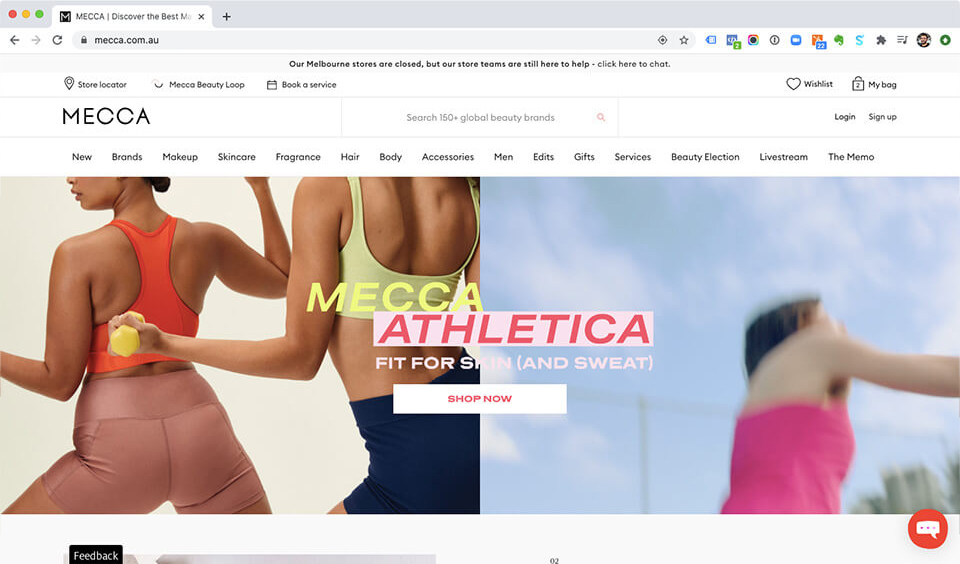
Book online
As we’ve already seen, in-person customer engagement plays a huge role in Mecca’s strategy and success. One of the options at the very top of the site allows customers to book a service

Unsurprisingly during these times, the first thing you see when you click through to book a service is an update around how they are operating during the pandemic.
One of the ways they have counteracted the restrictions is to offer virtual appointments through their website.
Regardless of which one you pick, booking a service couldn’t be easier and you can see the 3 steps numbered at the top of the page.
It only takes 6 clicks to book an appointment and, if you’re logged in, you don’t even need to enter any additional details. The site pre-populates the fields for you – Simple but very helpful.
Rotate important information at the top
![]()
![]()
![]()
Mecca rotate three key messages through the bar at the top of the screen, highlighting
- A sales message (free shipping on orders over $50)
- A safety message (Our Melbourne stores are closed but our store teams are still here to help)
- And a customer service message (Eagerly awaiting the arrival of your MECCA order? Track its progress here)
All helpful in very different ways.
Navigation couldn’t be easier

Know what you want?
The search box is front and centre with a call to action that highlights one of their USPs – Search 150+ global beauty brands.
If you’d rather browse, the top-level categories are displayed in a big, but clear, navigation bar as you would expect. It gets interesting when you start to explore those categories

The subcategories are also very clearly laid out and even delve further into sub-sub-categories.
They even include related products such as lip and eye care in case that’s what you were after.
On the right-hand side they display related content, but I’ll cover that more later in the article.
Helpful category pages

This is a standard category page for Mecca.
At the top is a short intro before highlighting a number of popular brands in the category.
Why highlight the brands?
Because when it comes to beauty products, customers are known for loyalty towards specific brands and products that they have tried and tested. They often purchase the same product a number of times over months or even years.
But beyond that, they then highlight the best product (as voted for by their customers) in that particular category. This makes it very easy for the many shoppers who are on the lookout for the best quality/value products.
These are both great ways to pre-empt what the customer wants and to try to give it to them quickly, but if they don’t succeed, Mecca has a very impressive filtering/refining system.
Above and beyond filtering options
Refining options
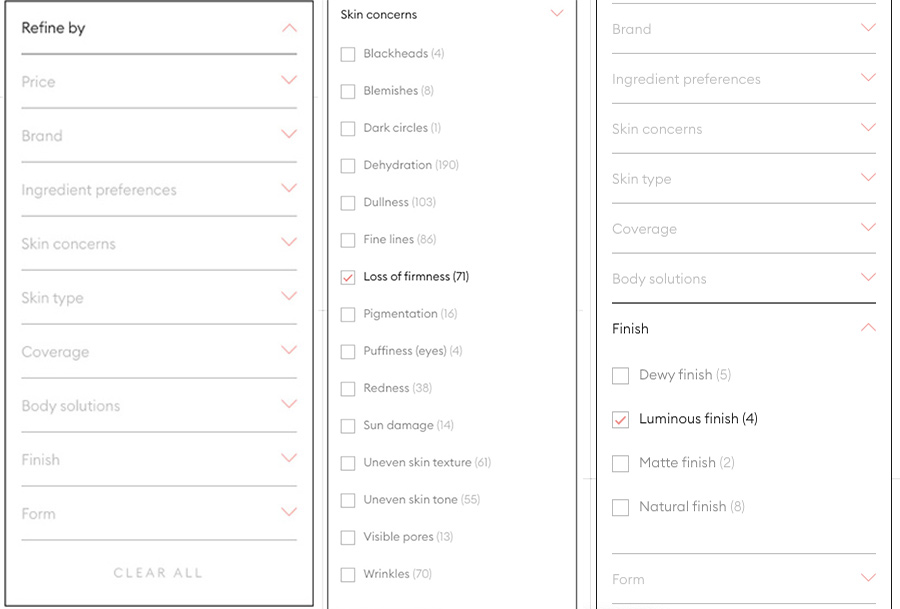
Mecca have the standard filters you would expect like price and brand but they also go into a lot more detail by breaking down moisturisers by finish, skin concerns, form, and more.
This is unlikely to be data provided by the manufacturers in the SKUs, which means that Mecca have gone to the trouble to catalogue and identify each of these characteristics, for all of their moisturisers!
And it’s not just for moisturisers. You’ll find this level of granularity across makeup, fragrances, body, and even men’s products.
That’s one of the most impressive commitments to providing the customer with what they want that I’ve ever seen.
They give customers all the info they need… and more
Let’s take a look at one of their standard product pages (best selling and award-winning products have even more content but I thought it would be best to look at what they do for ‘normal’ products)
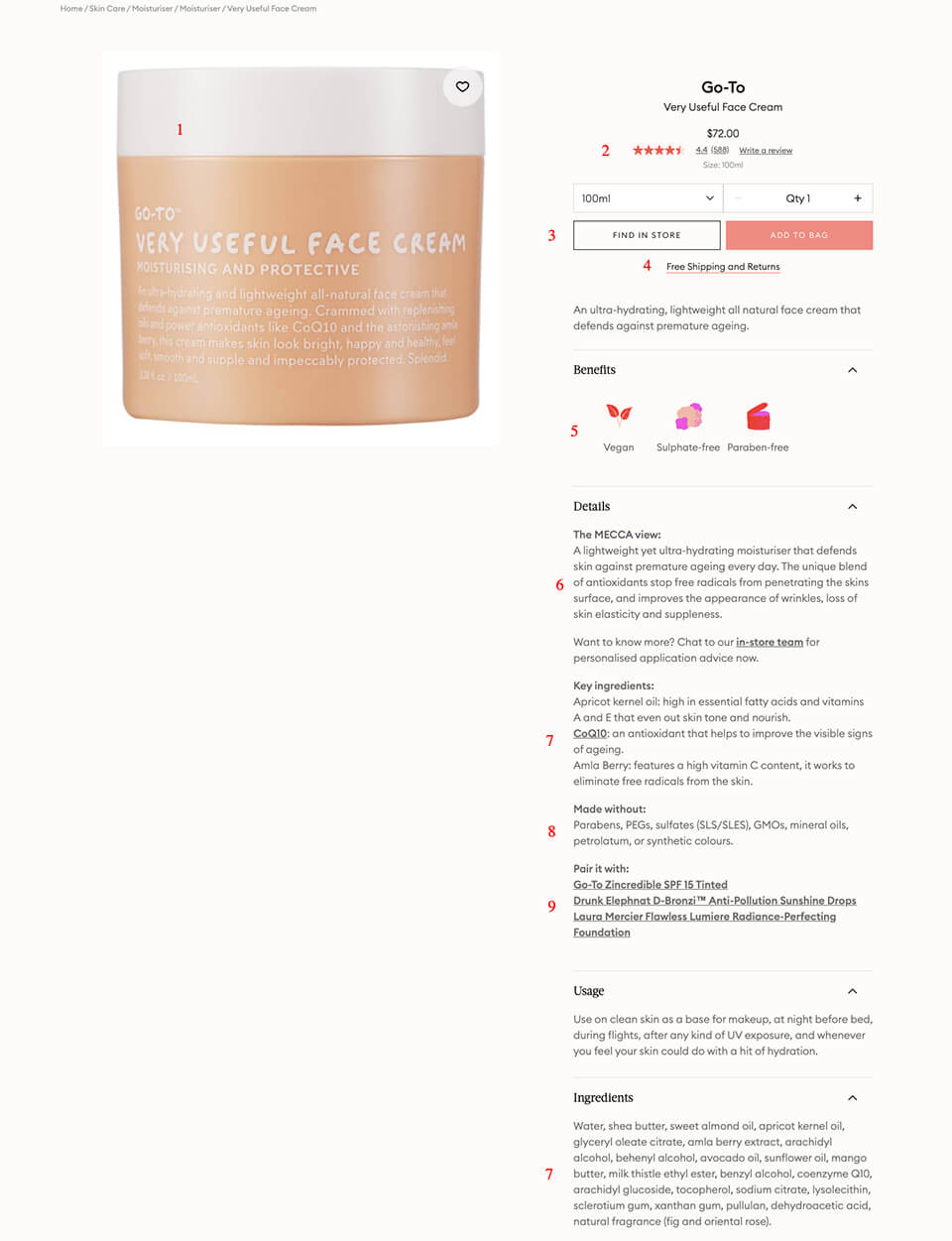
Note: On the actual page the image stays constant while you scroll through the information on the right-hand side. Unfortunately, screenshotting software hasn’t found a way to get around this.
This part of the page isn’t spectacular but there are a number of basic things that Mecca do really well to help the customer such as
- An image where you can clearly see what you need to (in this case, the packaging which contains a short blurb on the product)
- A review score which links to the actual reviews at the bottom of the page
- Two buttons to make it easy to either shop online or find in store
- Highlighting free shipping and returns – If you’re in eCommerce you shouldn’t need another article telling you why this is a good idea
- Point out key benefits in an engaging way
- An entirely unique description of the product – again, another essential eCommerce staple
- A list of ingredients – very important for this industry
- A list of missing ingredients to help the customer feel safe that no potentially harmful chemicals were used
- Other products that compliment this one – a great upsell
The rest of the page is what really impresses me though.
Showcase the products in action

It’s 2020, in my opinion, it should be standard practice that eCommerce sites have videos that show products actually work.
Mecca haven’t even created this content from scratch. They are leveraging a video that the brand have already created. (You can watch it here if you want).
Once again, it shows how Mecca gives customers all the information they need in order to make purchasing decisions.
Automate upsell and cross-sell
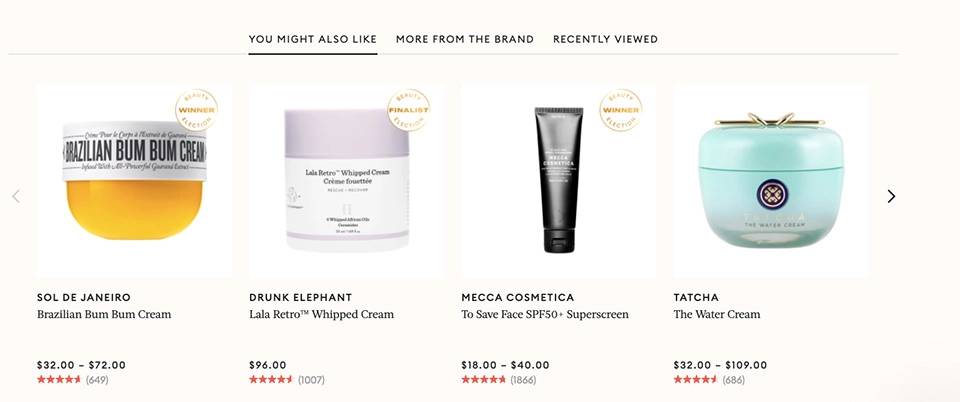
Mecca included links to products that match this one in the product description so when you scroll further down the page, Mecca suggests products that are similar, in case this one didn’t tickle your fancy.
The options in this section are almost certainly loaded by a plugin to their CMS – showcasing the most popular/best-selling products in the category, other products from the same brand, and products you recently looked at.
Segmented reviews

Like any good eCommerce site, Mecca displays reviews of their products on the product pages.
One thing they do that takes their commitment to the customer further is give the viewer the ability to segment the reviews by additional filters that might apply to them.
Want to know what people in your age bracket think? Select that. What about if you’re wondering if it works for your skin tone? Just choose it from the options.
This takes away the biggest problem with reviews – people thinking the reviewer is different from them.
Some businesses are afraid to ask for additional information in order to be able to break it down like this but as a general rule, if you tell customers why you want specific information, and it’s a genuinely useful reason, they are likely to provide you with it.
Product-specific FAQs

Most eCommerce sites will have an FAQ section where they provide information about shipping, returns, and other general enquiries but Mecca take it one step further by allowing people to post questions on the product pages.
These are usually posted when someone is still unable to find out what they want in the reviews.
The questions are answered by other customers, building a community where everyone helps each other.
They provide support with chat

Still need help?
Mecca are quick to put you in touch with a real team member if you need them.
At the time of writing, Melbourne is in stage 4 lockdown. It looks like they have put their employees in the state to work by helping customers online.
Bonus: they’re really friendly and helpful 🙂
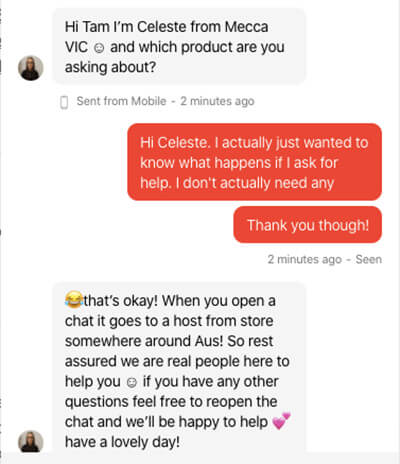
Website takeaway: Mecca have created a website that brings their customer-centric approach to digital. They go out of their way to bring specific and unique information to the customer in order to help them make a purchasing decision and drive online sales.
Content Marketing
Given Mecca’s commitment to their customer, it should come as no surprise that they create a lot of content for them.
Their content serves multiple purposes.
Their content attracts new sales
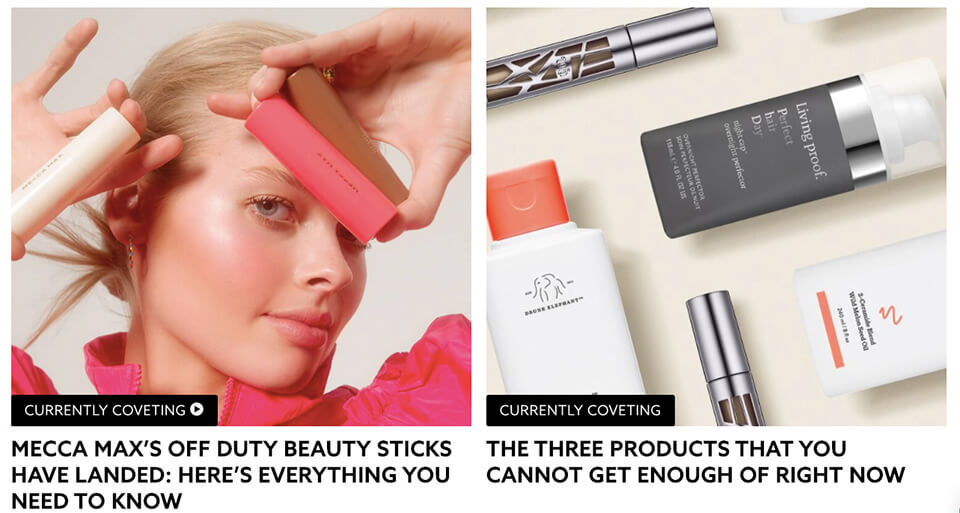
Here are two examples of content from the “Currently Coveting” section of their blog.
This kind of content highlights the latest trends as well as best-selling products of the moment. It serves as a vehicle to show customers what’s currently in vogue and what they should consider buying.
But they also create content that goes into more depth to explain the benefits of certain products in a section called “The In-tray”
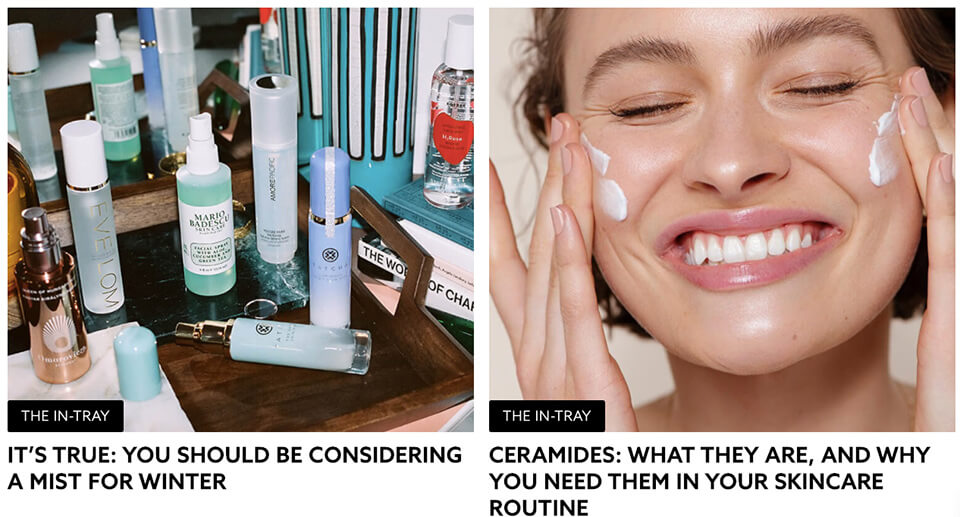
In essence, this content tells customers what products they should be considering right now and so the content itself is filled with links to those products, as well as a section at the bottom of the articles that promotes the products they’re discussing.

Their content educates their customers
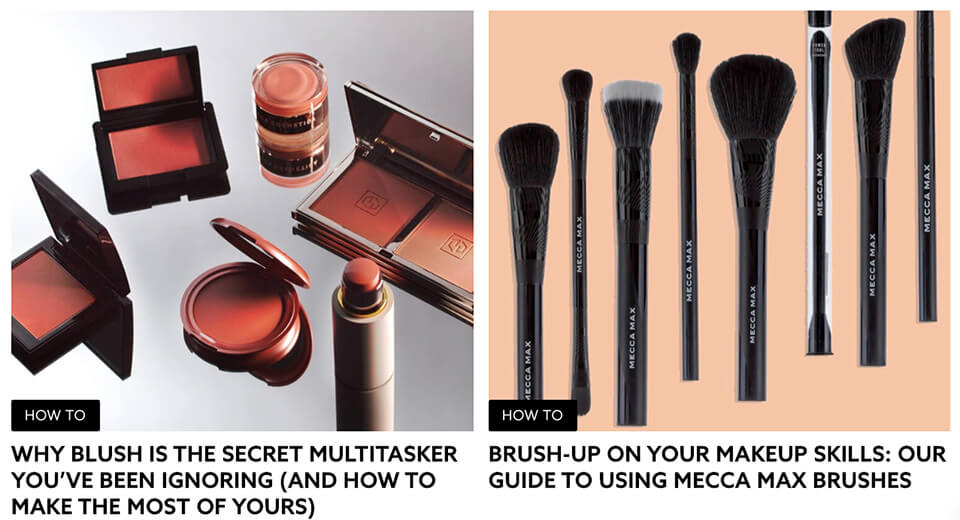
Mecca literally have a section of their blog called “How to”
By educating their customers on how to use or get the most out of their products, Mecca is giving them extra value. This, in turn, builds further loyalty to the brand as well as driving sales of the products they educate them on.
Their content entertains
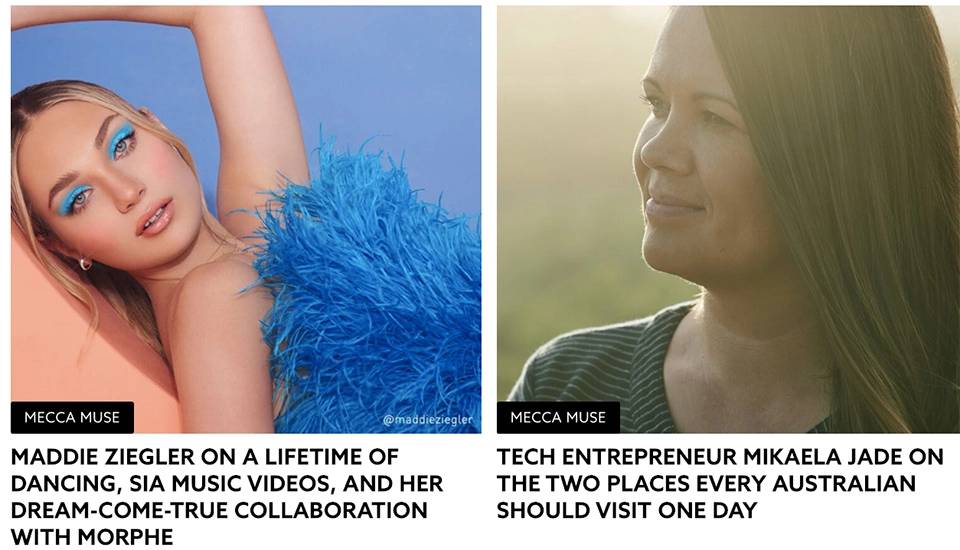
There’s a couple of examples here from the “Mecca Muse” section of their blog, where they interview celebrities and fashion/beauty icons to share their story, their style and their tips.
The beauty industry is all about lifestyles and so showcasing the lifestyles of relevant celebrities gives customers something to admire, emulate, and learn from. They can see what others are doing and think about how it could apply to themselves.
It’s all about Mecca giving customers more value as well as an extra touchpoint with their brand.
They promote content throughout the site
How you promote and position your content can be just as important as what the content says.
As well as the expected channels – a blog, social media, YouTube – Mecca promote content throughout the site in the sections where it’s most relevant.
For example, if you’re searching for makeup, they share makeup related articles in the navigation bar of the site

This content should help to sell more makeup and so Mecca are attempting to give the customer what they want, when they want it.
They create interactive content to help sales
Another awesome example of content promotion on their site is the “Foundation Match” function that is promoted on the page for foundation
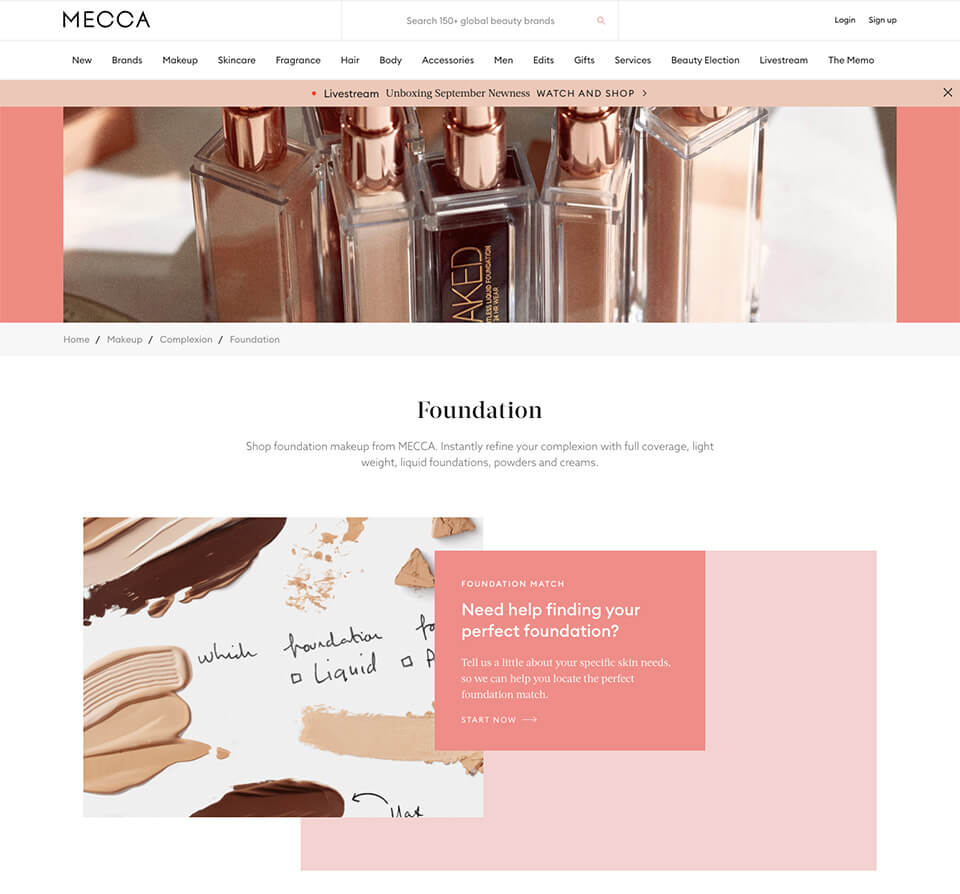
Buying a foundation that suits your complexion is notoriously difficult (or so I’m told) and so Mecca have made it easier to do online by creating a quiz that allows the customer to choose options that best reflect their preferences.

Once again, Mecca are giving their customers the information they need in order to make informed purchasing decisions.
Content takeaway: Mecca’s commitment to their customers really shines through in their content. They create content to attract, educate, and entertain their customers – not just to make more sales, but because it adds value to their experience and lives.
Paid Search
Google Ads often play a huge role in growth for ecommerce brands, driving high-intent traffic to the site in order to make purchases.
Note: Without access to their account, I’ve used SEMrush to analyse their ads – which only provides estimates.
Mecca spend a lot of money on Google ads
Desktop

Mobile
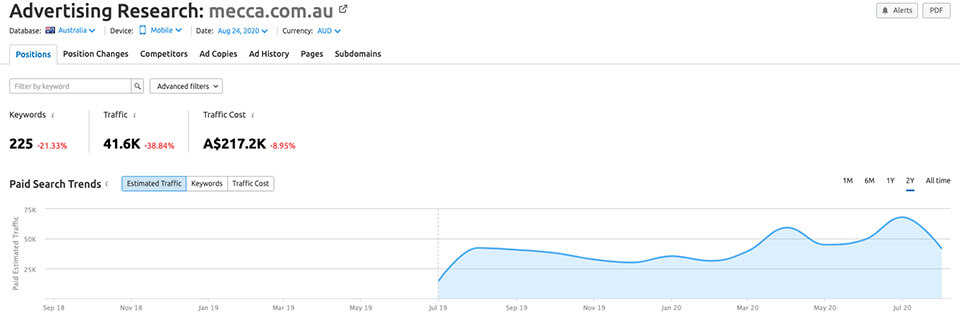
What surprised me here is that their estimated traffic during the lockdown period didn’t really increase on desktop, but almost doubled on mobile devices. With their shops closed and Australians flocking to online shopping, I would have expected a more sudden growth in traffic across all devices.
Let’s dig deeper into their account to see how they generate traffic.
They mainly target brand keywords
I exported a list of 676 keywords that Mecca are bidding on (according to SEMRush) and categorised them in order to analyse what they were bidding on. Here’s a quick definition of the categories
- Own brand – the keyword contains “Mecca”(e.g. mecca maxima sale)
- Product brand – The keyword contains the name of a brand that Mecca stocks (e.g. ‘clinique hydrating jelly’)
- Generic product – The keyword has no brand association (e.g. makeup kit)
Keyword performance
| Keyword type | % of traffic | % of spend |
| Own brand | 51% | 1% |
| Product brand | 47% | 98% |
| Generic product | 2% | 1% |
Almost all of Mecca’s paid search traffic comes from people searching for either their brand, or the brand of a product that they stock.
Mecca has a very strong brand with a loyal following so it makes sense that they would leverage it to drive paid traffic but to have so little come from generic searches is a surprise.
When it comes to spend, almost all of the estimated $365k a month goes on bidding for products that they stock.
Bids on their own brand are likely to be very cheap as few other businesses are going to be bidding on them but their competitors will also stock the same products and so bid on the same keywords.
What does this tell us?
It suggests that Mecca focuses its efforts on customers who know what they want and aren’t doing much research.
This is a pretty cost-effective approach as those visitors are more likely to convert (because they’re further down the funnel) but given how good Mecca is at building loyalty with customers, I would have assumed they could afford to spend more on trying to get people into the funnel so they could sell to them repeatedly in the long term. It’s definitely an opportunity for growth.
They leverage brand in their ad copy
So once somebody has searched (probably for a brand) what do Mecca say in their ads to convince them to come to their website?
Own brand ads
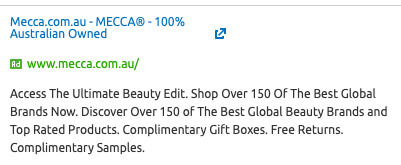
Here’s an example of an ad they display when someone searches for their brand. A few things of note that they highlight
- They’re Australian owned
- Their USP of over 150 best global brands
- Complimentary items
- Free returns
Very simple and effective.
Product brand ads
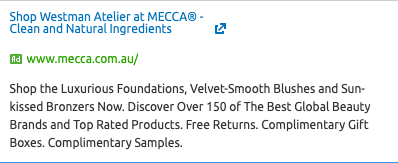
The headline of their product ads tends to follow a simple formula
Shop [brand] at MECCA (or something very similar)
But then they often bring in a USP for that brand in the second part of the headline as well as in the main ad copy.
To do that over 150+ brands shows that they are devoting time and effort to every brand search and not just relying on their own brand to pull customers in.
When they’re not highlighting brand USPs, they are highlighting their own such as
- Official stockist
- Free delivery
- Exclusively at MECCA
Generic product ads
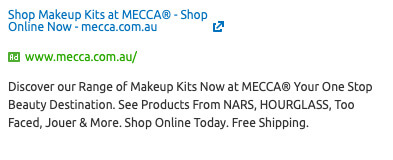
Even when a consumer searches for a generic product, Mecca tends to name drop the brands that they stock in order to leverage their credibility and entice the person searching to visit the eCommerce store.
Paid search takeaway: Mecca rely on and leverage the credibility of the brands that they stock, as well as their own, in order to drive paid search traffic to their site. They focus their efforts on the people with the highest intent who probably already know what they want and are more likely to make a purchase.
Organic Search
We’ve looked at the keywords that Mecca bids on, now let’s see the keywords they rank for and how they do it.
They get A LOT of organic traffic

SEMRush estimates that Mecca drives 959,000 users to their site with organic search – that’s more than 10x the amount estimated for paid search!
So what are all those people searching for?
Brand is the bulk of their organic traffic
Once again, I’ve taken the data from SEMRush which provided 50,000 keywords that Mecca rank for – that’s too many to categorise in the same way that I did for their paid search ads.
However, I was able to analyse that an estimated 66% of their traffic comes from searches with the word “Mecca” included – the majority of their organic traffic comes from searches for their own brand.
This is pretty standard across most businesses, especially ones with a brand as well known as Mecca.
Their site is well structured for SEO
One of the benefits of having a website that is easy for users to navigate through is that it’s also easy for search engines to navigate through.
The use of categories, sub-categories, and even sub-sub-categories gives the search engine a very good idea of the content of each page, plus the URL structure and breadcrumbs help make it extra clear
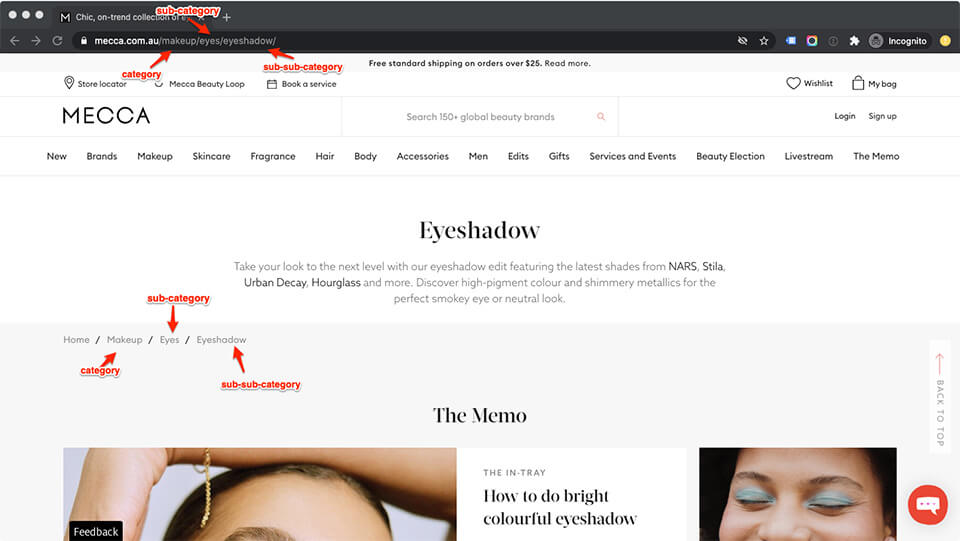
They also have unique copy on every unique URL, for every single product and brand that they work with. That helps to ensure they rank organically when those products or brands are searched for.
They don’t focus on building links
However, taking a look at Mecca’s backlink profile suggests that they are not particularly aggressive when it comes to link acquisition
Very natural looking anchor text

For example, if you take a look at the anchor text used to link back to their site, it’s mostly made up of brand terms and the occasional product that the stock.
While most brands will have their brand name (or associated words) as the most used anchor text, a business that invests significantly in link building would also have links for specific terms (like “makeup kits” or “best eyeshadows”).
A steady growing number of linking domains

It’s a similar story when you look at the total number of domains that link to Mecca. There are no significant spikes so I would assume that the growth in links is due to the growth of the brand and not due to SEO activity.
Organic Search takeaway: Mecca’s site is set up well for SEO (as well as users) and that seems to help them drive significant traffic despite the fact that they don’t build links very aggressively.
Facebook Ads
Facebook’s ad platform can help reach almost anyone in the country so it’s a great channel for most brands but especially one who has a large audience, like Mecca.
I’ve used Facebook’s Ad Library tool to find and analyse the ads that Mecca runs through the platform.
Here’s a breakdown of some of the ads they run.
They promote specific products
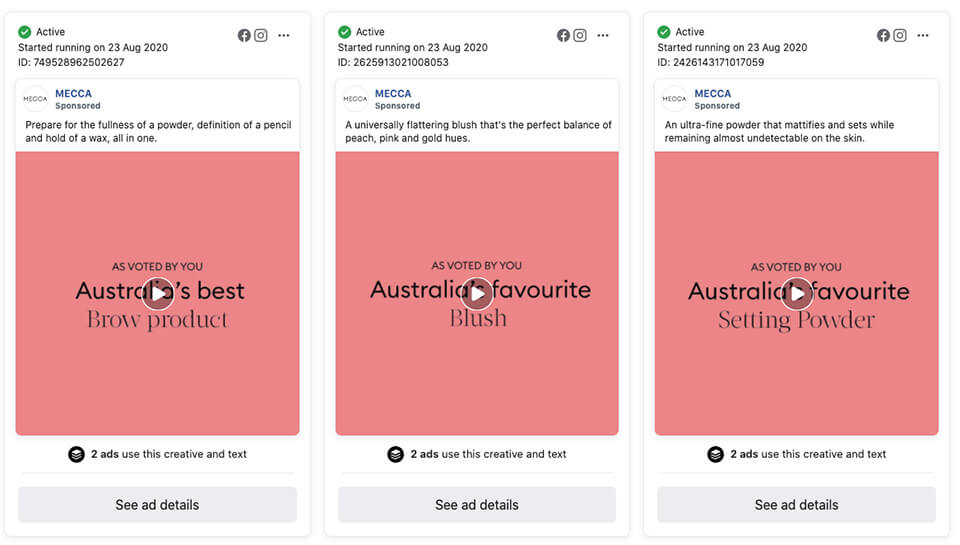
Mecca run ads promoting specific products.
Given they’ve just run elections for their customers to vote on their favourite products – those are the products they are choosing to showcase.
The ads themselves are simple and effective. They show the product in use while highlighting the specific features then name them with a prompt to “shop the winner”
As well as the standard 1:1 ratio for feeds and in-stream videos, the ads have also been created in the 9:16 ratio for Facebook/Messenger/Instagram Stories.
They promote seasonal/popular categories
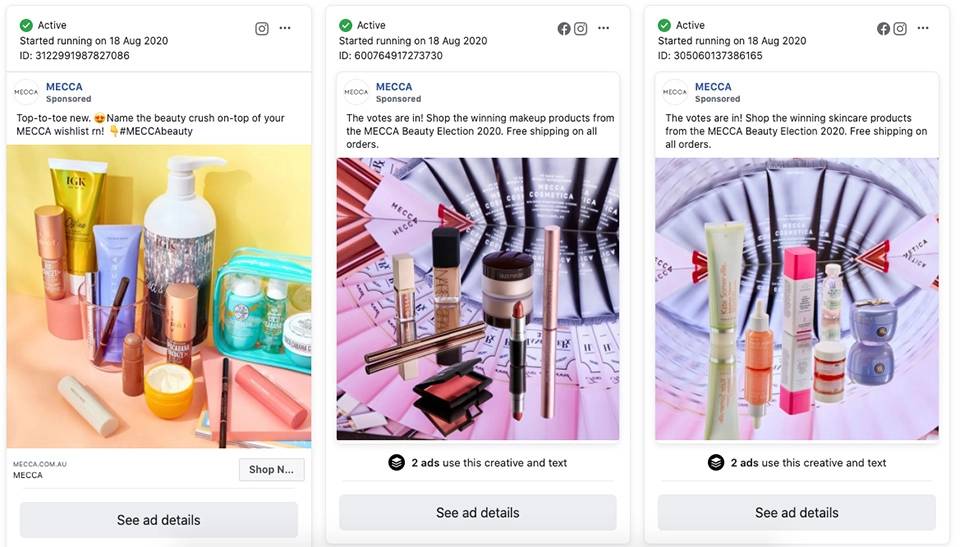
Mecca also run ads promoting product categories that are currently popular. In the case above – their new season selection as well as the products that were voted for in their annual beauty election.
These ads are static images that showcase a range of products but they are all vibrant and eye-catching, designed to stop your thumb as you scroll through your social media feed.
They promote helpful content
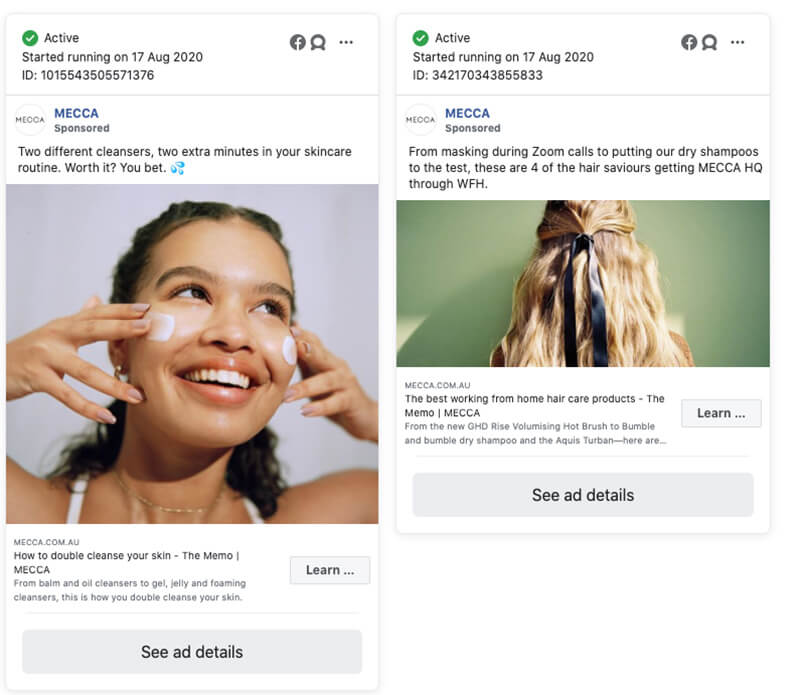
Mecca also use Facebook ads to promote articles that share tips and advice with their customers.
These are often topical/seasonal (e.g. “The best working from home hair care products” or “Why you should update your cleanser for winter”).
As well as provide the customer with useful information, these ads serve as an additional touchpoint and a reminder that Mecca is there for all their beauty needs.
Facebook ads takeaway: Mecca’s Facebook ads are very simple and I believe the aim is not necessarily to sell specific products but to provide an additional brand touchpoint to remind customers that they exist and to drive them back to the site.
Email marketing
Email can be a very powerful tool for eCommerce businesses when used correctly. For some of our eCommerce clients it delivers as much as 25-30% of their revenue.
Here are a couple of ways Mecca utilise email marketing.
They remind you to come back to purchase

A staple for any eCommerce business – Mecca sends emails to people who have added items to their basket but haven’t made a purchase.
The email subject line is “Are you forgetting something?” which is effective (though unoriginal) and serves as a prompt to check out the items once again.
Something Mecca does well here is highlight some of the key benefits at the bottom of the email – Free shipping (also at the top), free returns, their price promise, and the complimentary items.
However, the related products they push in the email aren’t really relevant to hand moisturiser or men’s shampoo.
They send roundups of their content

Every Sunday Mecca send a roundup email containing a few of the recently published articles from their blog – The Memo.
This serves as a way to promote their content, but also as an additional touchpoint for the brand.
They send emails promoting their hero collections

You should recognise Mecca Athletica from my analysis of the home page, where I mentioned the hero banner changes often based on my multiple visits to the sites over the last few weeks.
Centering your marketing around one theme is a great way to really drive the message home to your target audience. The more they see a particular product or collection, the more likely they are to want to know more about it, and eventually make a purchase.
Email takeaway: Mecca’s emails are designed well and follow a theme but aren’t necessarily set up to make sales. I suspect that email plays more of a role as a brand reminder rather than to sell specific products. With a brand as strong as Mecca’s there’s nothing wrong with that, but they could potentially do more.
Key Takeaways
Customer centricity
Mecca and their customers both benefit from the desire to put the customer first. The more they educate their customers, and the more their customers feel catered to, the more likely they are to purchase. They also reward loyalty in order to make more revenue from each customer.
Website
Mecca have created a website that brings their customer-centric approach to digital. They go out of their way to bring specific and unique information to the customer in order to help them make a purchasing decision and drive online sales.
Content
Mecca’s commitment to their customers really shines through in their content. They create content to attract, educate, and entertain their customers – not just to make more sales, but because it adds value to their experience and lives.
Paid search
Mecca rely on and leverage the credibility of the brands that they stock, as well as their own, in order to drive paid search traffic to their site. They focus their efforts on the people with the highest intent who probably already know what they want and are more likely to make a purchase.
Organic Search
Mecca’s site is set up well for SEO (as well as users) and that seems to help them drive significant traffic despite the fact that they don’t build links very aggressively.
Facebook ads
Mecca’s Facebook ads are very simple and I believe the aim is not necessarily to sell specific products but to provide an additional brand touchpoint to remind customers that they exist and to drive them back to the site.
Mecca’s emails are designed well and follow a theme but aren’t necessarily set up to make sales. I suspect that email plays more of a role as a brand reminder rather than to sell specific products. With a brand as strong as Mecca’s there’s nothing wrong with that, but they could potentially do more.
Summary
Mecca have built their business around the needs of their customers and that is evident across their digital marketing.
Their website and content marketing, in particular, are exemplary examples of how they put the customer first.
They have built a brand that customers love and leverage that loyalty by relying on their marketing to act as “touchpoints” to encourage their customers to come back.
They never push or force the sale, which means they could be leaving money on the table, but they seem content with that so long as the customer is happy.


